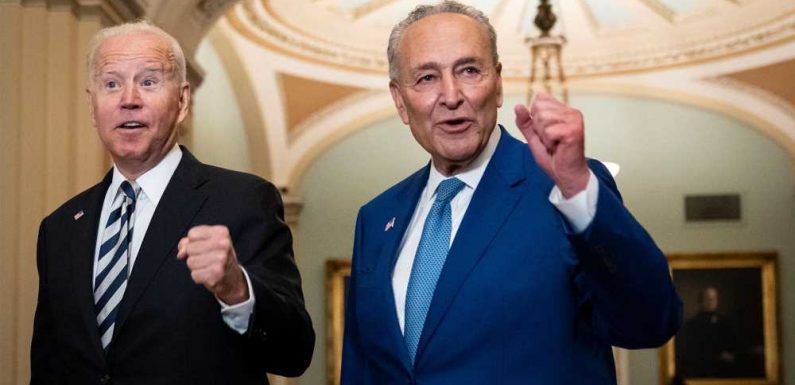
More On:
infrastructure
$1T bill may require drunk driving locks, hot car alerts for new vehicles
Driver fee pilot program in $1T infrastructure plan could cross Biden’s ‘red line’
Budget office says infrastructure bill would add $256B to federal deficit
McConnell warns Dems not to expect GOP support on raising debt limit for ‘socialist shopping list’
Senate Majority Leader Chuck Schumer has teed up a vote for the weekend on the $1 trillion bipartisan infrastructure plan, ending debate late Thursday evening by filing cloture on the sweeping measure.
While the final vote time remains unclear, the Senate is scheduled to come back into session on Saturday at noon, with lawmakers out of session on Friday for late Sen. Mike Enzi’s (D-Wyo.) funeral.
Top lawmakers in the upper chamber had hopes of passing the measure on Thursday evening, but parties remained at odds over votes on additional amendments.
“I believe we’re very close to an agreement and see no reason why we can’t complete this important bipartisan bill,” Schumer (D-NY) said on the floor on Thursday evening, adding that they will follow regular order after the procedural vote. “So I urge both sides to continue working diligently to make it happen.”
If the cloture vote passes Saturday, Senators would be allotted up to 60 hours to debate the measure.
A battle of cryptocurrency-related amendments proved to be a sticking point with lawmakers, with the White House coming out in favor of an amendment led by Sens. Rob Portman ( R-Ohio), Mark Warner (D-Va.) and Kyrsten Sinema (D-Ariz.) over Sens. Ron Wyden (D-Ore.), Pat Toomey (R-Pa.) and Cynthia Lummis (R-Wyo.).
“We are grateful to Chairman Wyden for his leadership in pushing the Senate to address this issue, however we believe that the alternative amendment put forward by Senators Warner, Portman, and Sinema strikes the right balance and makes an important step forward in promoting tax compliance,” White House spokesman Andrew Bates said in a statement.
The underlying infrastructure package — negotiated by a group of 22 bipartisan lawmakers, led by Sinema and Portman — was unveiled last Sunday and includes $550 billion in new spending, with $110 billion set to be allocated toward roads, bridges and other projects; $65 billion toward broadband, $66 billion set to be spent on passenger and freight rail, $55 billion for water infrastructure, $39.2 billion for public transit, $47.2 billion for resiliency purposes, $7.5 billion for electrical vehicle infrastructure and $21 billion to address pollution.
Top Democrats are also looking to pass a budget to allow them to move forward with the reconciliation process, bypassing Republicans altogether in the Senate on a $3.5 trillion proposal to address broad social spending and “human infrastructure” before the upper chamber breaks for August recess.
Share this article:
Source: Read Full Article

